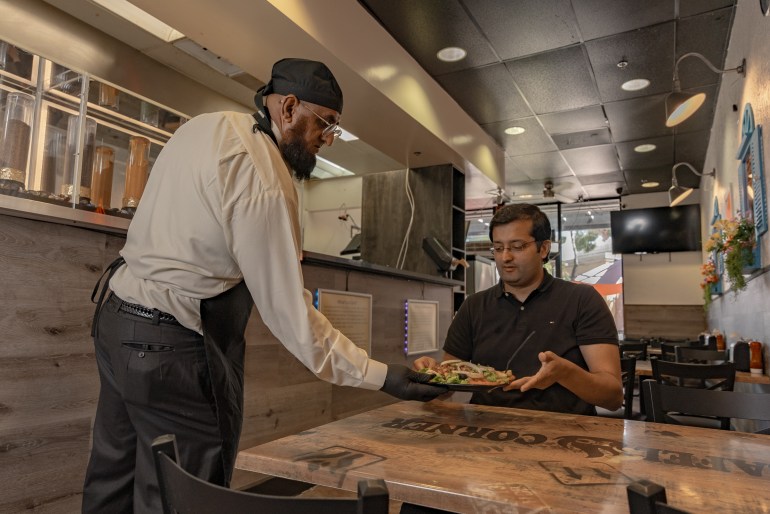A visit to the mosque was not the only thing on Shakoor’s mind after he got his freedom back.
Like many formerly incarcerated people re-entering society, there was a long list of needs to attend to, many complicated by his status as a person with a felony conviction: securing housing, catching up with loved ones, finding work.
He fared better than most, getting a job at a Bay Area Middle Eastern restaurant called Falafel Corner several weeks after his release. The skills he had fine-tuned with makeshift hot plates in his cell and prison kitchens were now put to work building a new career, and he quickly moved up to managing the restaurant.
In 2016, the restaurant opened a second location in Sacramento, and in 2018, Shakoor bought out the former owner. He says the business now has more than 30 franchises around northern California.
If cooking was one skill that Shakoor continued to build after leaving prison, his interest in criminal justice reform work was another.

In 2014, Shakoor, who had remotely obtained a degree from Ohio University while incarcerated, testified at the State Senate in support of SB 1391, which expanded access to college education for people incarcerated in California’s prisons. The bill was passed and signed into law in September 2014.
In 2023, he also became a vocal supporter of SB 309, which created universal standards applying to religious grooming and headwear across California’s detention facilities.
He drew on his own experiences of harassment for expression of religious devotion behind bars, recalling an incident in 2002 when he was sent to solitary confinement for seven days for refusing to remove his chitrali cap, important to his identity as a Muslim of Pakistani heritage.
But perhaps his favourite type of activism has come in the form of sharing food and worship with fellow Muslims in prisons across the state, a practice he began in 2017.
He says he typically does about five such visits per year, sometimes as many as 10. They are no small task, requiring hours of cooking and the even more strenuous ordeal of navigating the exhausting bureaucracy of the prison system.
But Shakoor sees the events as a source of fellowship and optimism for the prisoners in a situation that can otherwise feel oppressively hopeless.
During his time in San Quentin, when he still believed he would spend the rest of his life behind bars, he recalls becoming enamoured with a pair of flowers that had managed to sprout up from a crag of inhospitable rock.
“We can’t always change our surroundings, just as that flower couldn’t,” he says. “But we can learn to rise above the things holding us down and use our surroundings to cultivate us.”
Back in the room in Solano decorated with colourful murals, Kali, the 69-year-old man savouring his burrito, whom Shakoor has known since they were both incarcerated in Pleasant Valley State Prison, talks about the purpose and sense of peace that he has found through Islam.
He first converted in 1992, during a stint in solitary confinement, where he took what he called a “moral inventory” of himself by diving into the Bible and the Quran.
For many condemned to life in prison, religion offers a means of resisting, if never entirely escaping, the downward pressure of despair that comes with a life that is forever confined.
The physical proximity of the free world, often visible just beyond a window or a concertina fence, only adds to the tantalising sense of foreclosed possibility. In such circumstances, it seems miraculous that sources of warmth, creativity, and fellowship emerge at all.
It is a feeling that Shakoor deeply understands, and that Kali says he now helps others try to live with by leading anger management classes in Solano.
He quotes his favourite verse from the Quran: “Verily, with the hardship, there comes ease.”
